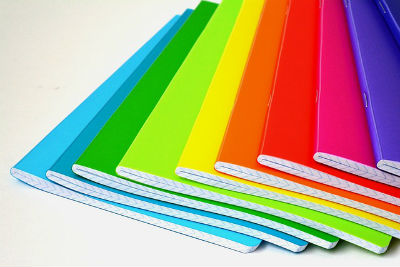As I have often acknowledged, I’m crazy about notebooks. Small, large, ring-bound, hardcover, with graph paper, or with blank paper … it doesn’t matter! It’s a real pleasure to write in them, and no matter how many notebooks I have, I always find a good reason to use them all.

In this entry, I’d like to explain how notebooks can carry out many functions other than story writing. They can be used to boost your creativity whenever you are hungry for ideas and inspiration.
Even though notebooks can be in digital format these days, sometimes it is more advisable to let your pen glide over actual paper so tangibility can play a helpful role when you are seeking the muse. Anyway, let’s set aside the format issue and take a look at the different types of notebooks you can create.
1. Idea Notebook
It’s obvious that any writer should have a place to jot down ideas. If possible, choose a small pad you can carry around easily. I usually keep it in my bag and put it on my bedside table at night. You never know where or when you’ll be hit by a great idea, but you already know what happens if you don’t write it down!
2. Reading Log
In the drawer of my bedside table, I have a reading log which is simply a notebook to keep track of all the books I have read. There are several ways to record this information, and you can include many sections such as a summary of the story, notes on the writing style, the type of narrator, the characters, etc. You can also add images, photographs, newspaper clippings, or anything else for that matter.
My reading log is quite simple. I like to note the title and author of the book, the start and finish dates of my reading, the score I give to what I read, and the opening sentence of each book. This is because of my obsession with book beginnings.
3. Dream Diary
This is the typical notebook where you write down what you have dreamed about so you do not forget it. Over time, you can find great ideas from such a notebook – not to mention how funny it is to reread the crazy experiences your mind has created while you were asleep.
4. Quote Book
Apart from book beginnings, I also like to collect quotes and sentences from the authors and books I like. On my bedside table (I bet you’ve realized it is loaded with notebooks!), I have a tiny moleskin notepad with a book-like binder. That’s where I copy the sentences that grab my attention. I usually find the quotes in books, but sometimes they are waiting for me in magazines, interviews, newspaper articles, etc. Getting lost inside the pages of a quote book is something great and very inspiring.
5. Scrapbook
These days, this type of notebook can also be digital thanks to sites like Pinterest and Evernote. They are fantastic tools that allow you to save those virtual pictures or bits of news that might stimulate your imagination in the future.
Nevertheless, I still recommend that you create a physical scrapbook because of its mixture of colors, shapes, contrasts and odors – yes, odors because newspaper or magazine clippings smell differently over time. Besides, cutting out and pasting news and images you consider interesting is also helpful in your search for ideas.
6. Logbook
A logbook could be defined as a diary where you gather personal experiences and emotions, but it doesn’t have to be the typical “Dear Diary” format children follow. It can also be used as a place to reflect on your writing. Let me explain.
It is as easy as merely writing about your writing process. You can analyze what you have written about, your daily or weekly progress, the difficulties with the first draft of your novel, etc. But above all, it is important for you to write down the emotions you feel while writing (or while not writing). Over time, it will help you realize how you go through specific phases when you face a creative task. Knowing yourself better will make you write better.
7. Character Notebook
The character sheets and the character collection from Literautas can come in handy for this notebook because its function is to put together all the characters you find suggestive. When you need ideas, you can turn to them and see if their descriptions inspire you.
8. Theory Notebook
As with any other subject, in order to write, you have to read a lot – and not just fiction. You also should read theory books and articles on the craft of writing such as the creation of dialogues, plot development, use of words, and all the other topics we writers love to explore.
9. Specific Story Notebooks
When you are writing a story, no matter if you are doing it on the computer or on paper, it is convenient to have a notebook handy that contains all the information related to the story’s characters, structure, setting, etc. so you can look things up when necessary.
10. Automatic Writing Notebook
This is not exactly a notebook where you write short stories. Instead, it’s a place to release creative ideas from your subconscious when you free write around 100-200 words. To make the process easier, you can resort to the trick of picking five random words (such as crime, temple, war, desire, and statue) and using them all to write the first thing that comes to your mind – no thinking! Just writing … let it flow.
I recommend that you practice automatic writing at the same time every day as a sort of personal ritual. You can do it while eating something you enjoy like candy, fruit salad, or anything else that will make the moment special. Believe me when I say it will not only stimulate your imagination, but it will also relieve tension and release stress. To put it in a nutshell, it is the best medicine to lift your spirits.
So … these are all the notebooks I carry (or have carried) with me in my day-to-day life. There are quite a few of them, I know, but they have all been helpful to me.
 This site uses cookies. By continuing to browse the site, you are agreeing to
This site uses cookies. By continuing to browse the site, you are agreeing to 



Thank you for these tips, they are very usefull.
I’m a songwritter and I have sudden moments of ispiration.
I’m Mexican, and my english is not perfect, but I’m learning. Saludos !
Thanks, Emiliano! I’m glad you like the post.
By the way, you can read this site in Spanish too, if you wish 😉
¡Saludos!
I’m also crazy about notebooks! An idea I read about some time ago is keeping a “character journal,” that is writing in first person in that journal – about anything – as though you were that character. Many story ideas can sprout this way, and it’s an excellent activity during periods of writer’s block.